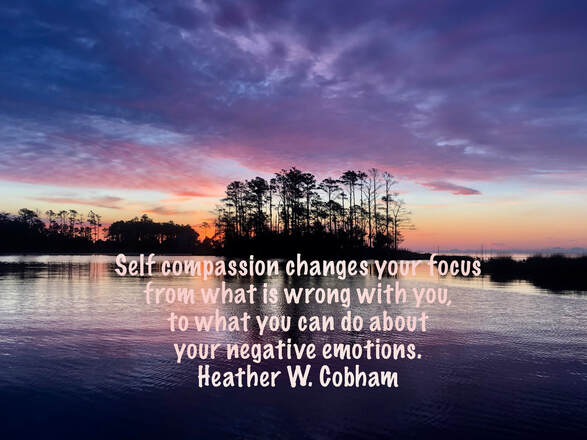|
Occasionally I notice themes in the challenges my clients have, like negative core beliefs, unworthiness, or the desire to make everyone happy. I’ve come to realize that my attention to these themes is less about a mental health trend, and more about an area of growth needed in my emotional life.
Last week, what captured my focus was how critical my clients were of their feelings. One felt she shouldn’t be angry about having an autoimmune disease, because she had many other things to be grateful for. Another, with both lung and heart disease, felt weak, because she had anxiety about continuing her work as a clerk at Target and another, grieving the death of her mother in February, felt she wasn’t progressing through her grief fast enough. I validated their core feelings and pointed out that their self criticism was adding to their emotional load and distracting them from dealing with their anger, anxiety and grief. I reminded them that their goal is to pay attention to their emotions and cope with them in a healthy way, and not waste time judging how they feel. The week progressed and I noticed more negative feelings in myself, like irritability and sadness. I couldn’t ignore them any longer when, at the start of the weekend, I burst into tears over something very minor. My heart was breaking, but I knew intellectually what triggered my tears was not something worthy of this response. After a few minutes of crying and feeling sorry for myself, I paid attention to my thoughts. “I need to get over this,” “I have so much to be grateful for. I shouldn’t be sad,” and “I need to pull it together. I’m a mental health professional.” I was doing the same thing my clients were. I was sad, and my immediate response was to beat myself up about how I was feeling. Once I identified my self criticism, I grabbed my journal to figure out the core issues beneath my sadness. Through my writing, I identified that I was overwhelmed with my clients’ suffering, and questioning my ability to make a meaningful difference in their lives. These are hallmark symptoms of burnout. Now I had something to work with, and before I began criticizing my burnout, I immediately focused on self compassion. Kristin Neff, a researcher on self compassion, says that, “Instead of mercilessly judging and criticizing yourself for various inadequacies or shortcomings, self-compassion means you are kind and understanding when confronted with personal failings.” Self compassion doesn’t come naturally to most of us, and to help myself along, I talked to myself in the manner I knew my kindest friend would. I’d been working hard the last 2 months providing support and comfort to others, while also experiencing the pandemic at a personal level. I missed family and friends, worried about their health and my own, and had anxiety about the future. I took a breath and told myself it was OK to feel burned out. Being emotionally drained in these circumstances was a symptom of being human, not a symptom of weakness or ingratitude. This was an interesting internal experience. Within seconds of implementing self compassion I felt better. In the negative feedback loop of self criticism, it seemed clear that what I needed to fix was myself. That I, was the problem. With self compassion, I saw that burnout was the problem, and I have have skills to deal with that. To address my emotional fatigue, I needed time away from my counseling practice and lots of self care. In the short term, I continued to journal that morning, had a healthy lunch outside with my husband and dear friend, and got a good night’s sleep. For the longer term, I adjusted my schedule to have a 5 day Memorial weekend filled with activities that recharge me like writing, reading, time in nature, exercise, laughing with my husband, and sleep. I’ve talked clients through this process many times, but am embarrassed to admit I’ve never used it as effectively as I did in this instance, and it significantly decreased my distress. If self compassion helped me, maybe it helps my clients too, and I really am making a difference! I encourage you to try this process for yourself. Here is a summary:
0 Comments
|
Archives
November 2023
Categories |


 RSS Feed
RSS Feed